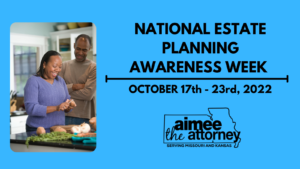
Sally and Robert are in their 50s and both in relatively good health. They have been married for 25 years and have two children, Jack and Kaitlyn, who are both in their 20’s. When Sally and Robert first married, they decided they would become joint tenants on all the property they owned. By putting their property in a joint tenancy, their property would automatically go to the other spouse in the case of death. They did this for their house, cars, and bank accounts. They believed that this would solve any issues of who gets the property if one of them were to die, and it would keep them out of probate court.
Jack is going to law school to become an estate planning attorney. Jack has learned a lot about how to set up wills and trusts. In one of his classes, he understands that there are some negative things about relying on joint tenancy for property in the case of death and more. He goes home and talks to his parents about setting up a will for the two of them. Robert says, “But your mom and I have a joint tenancy on all of our property; why would we need a will?” So Jack explains what can happen if there is no will as a backup plan.
Jack explains that if both of his parents die at the same time, then their property would go into probate court before he and his sister could gain ownership. This can be incredibly stressful regarding bank accounts and any money they might have. Without documentation, their children would not be able to access the money right away because they would need to go through probate court to determine if any debt needs to be paid; meanwhile, funeral and medical expenses add up.
Sally and Robert also face problems if one spouse becomes incapacitated and the other is still alive. In a scenario like this, one spouse would not be able to make any decisions about the property because they wouldn’t have the approval of the incapacitated spouse. If Robert is incapacitated and Sally has to pay for his care, there might come the point where Sally can only afford to pay for Robert’s care by selling one of their cars or, even more drastically, their house. Sally couldn’t do this because Robert couldn’t sign any documentation needed for the sale. A Durable Power of Attorney set up during Estate Planning solves this.
Another issue is what happens when the last surviving spouse dies. If Robert passed away three years before Sally, then all of their property would become Sally’s. If Sally never thought about what would happen to the property after she passes and doesn’t make a will, then the property would end up in probate court. Sally would need to see an attorney – at a time in her life when going to an attorney and making a will would be burdensome. Jack explains that it would make more sense if Robert and Sally went to an attorney when they were both in good health and started their estate planning.
When most people think about what will happen to their property when they die, they assume their spouse or children will automatically inherit everything. However, this is not always the case. If you die without a will, your property will go through probate court and may not end up with your loved ones. It is essential to have a will, even if you have joint tenancy on your property. Jack tells his parents that if they want specific things to go to him or his sister, they need to make a will now so that one of them doesn’t have to later when the other one dies, or a fight ensues about who gets what between Jack and Kaitlyn. He explains that taking care of this now can take the stress off everyone in the family. After hearing everything that Jack told them, Sally and Robert talk to their best friends to find out what lawyer they used when they did their Estate Planning.



